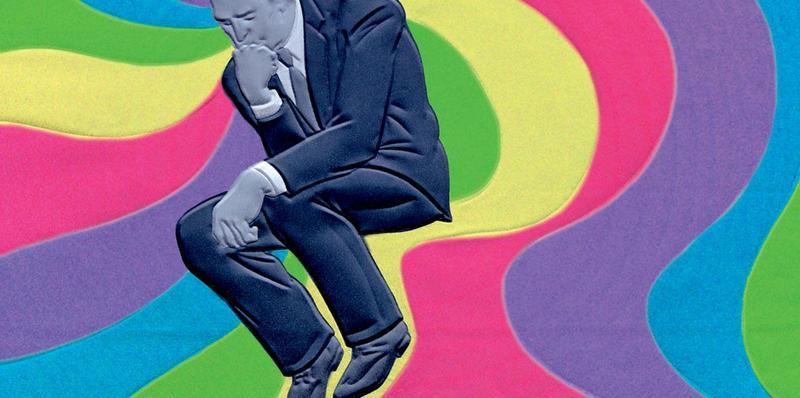Beyond Psychonautics: Inside the World of Microdosing
Beyond Psychonautics: Inside the World of Microdosing
Microdosing is an emerging trend among young professionals, particularly amongst the Silicon Valley set. If you are unfamiliar with this term, it means to take small amounts of psychedelics during the day in order to enhance focus, creativity, patience, and connection to others. The purpose is not to get high — a microdose is roughly one tenth of what would be considered a full dose — and the benefits certainly seem to greatly outweigh any potential side effects.
Many people are taking prescription drugs for the same purpose, but these come with a lengthy list of side effects and often leave users feeling groggy and tired. The potential for addiction here is high, too.
But these issues are virtually nonexistent with magic mushrooms or LSD, and both drugs are thought to increase your overall mood and problem solving skills, while also reducing anxiety.
According to WIRED, who covered this story, proponents of micro dosing, “including software engineers, biologists and mathematicians – say that it induces a ‘flow state’, aids lateral thinking and encourages more empathetic interpersonal relations.”
History Of Microdosing
Albert Hofmann synthesized lysergic acid diethylamide (LSD) in 1938 and took what is now considered the first intentional LSD trip in 1943. He regularly micro dosed during the last few decades of his life. Called the father of psychedelics, he lived to be 102 and found that consuming small amounts of LSD clarified his thinking, according to Dr. James Fadiman. Fadiman has been researching psychedelics since the 1960s and authored The Psychedelic Explorer’s Guide, which recognizes that the practice of microdosing for those silicon Valley types is driven by the same impulse that leads otherwise healthy individuals to take prescription medications like Ritalin and Adderall — to gain a competitive advantage in business.
“What you get is the best parts of Adderall with none of the side effects. You function better physically and mentally. You find the office jerk bearable and you’re more compassionate about the flaws of others,” he says. “You feel you’ve had a pretty good day.”
Clinical Trials
Unfortunately, there have been few clinical trials on the effects of microdosing, with the majority of the evidence being anecdotal thus far. The topic has been gaining some traction over the past few years, however, and the microdosing forum on Reddit has grown considerably. Even the term “microdosing” itself has been searched far more often on Google in recent years.
David Nutt, Director of the Centre for Neuropyschopharmacalogy at Imperial College London, has carried out groundbreaking imaging studies of the brain while it is on LSD or magic mushrooms.
“These drugs change cortical functions, making them more fluid and less rigid. At least big doses do – that’s what our imaging studies tell us – and maybe low doses to a lesser extent,” he says. “This may help certain brain areas work in more flexible and expansive ways that might give better outcomes.”
Professor of pharmacology at Purdue University, Indiana, and psychedelic expert David Nichols also believes it’s “quite possible” that low doses of LSD could have a stimulant effect by activating dopamine pathways in the brain, according to WIRED.
Although no clinical studies on microdosing and its effects have been found, Fadiman has been conducting his own experiments and research by collecting anecdotal reports from volunteers who self-administer the psychedelic drugs. Fadiman does offer guidance to the participants on how often and how much to dose, and in return they are required to keep a journal of their experiences and observations. He’s been collecting this data since 2010.
“It helps me think more creatively and stay focused. I manage my stress with ease and am able to keep my perspective healthy in a way that I was unable to before.”
— Lily, startup publicist
Fadiman already has reports from 125 participants, with 80 more on the way. He also receives many requests each month for advice for people who are looking to try out microdosing safely.
“It is no longer a fad. It is being accepted as a very different way to more safely benefit from psychedelics without any ‘psychedelic effects’,” he told WIRED. In such low doses, psychedelics should be viewed more like natural antidepressants and cognitive enhancers.
“Except you take them far less often.”
This is yet another benefit to choosing this method for treatment of depression or other disorders over prescription pharmaceutical drugs. Any people who contact Fadiman are experimenting with psychedelics to treat depression or anxiety disorders following disappointing results and/or side effects with prescribed medications. Of course, there is still growing interest among those seeking a competitive edge. “People report enhanced pattern recognition. They can see more of the pieces of a problem they are trying to solve at once.”
Conclusion
While there certainly seem to be some amazing benefits to this technique, current recommendations advise users to microdose only a couple of times per week rather than every day. As there have been no clinical or long-term studies on this process, so no one really knows the long-term effects yet. Have you experimented with microdosing? What kind of benefits have you experienced? Please share with us in the comments section below!
ALANNA KETLER/Collective Evolution
Be the first to post a message!
